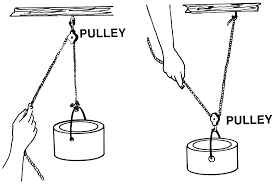中文词源
pulley 滑轮
来自古法语polie,滑轮,来自拉丁语poliva,来自希腊语polos,轮轴,滑轮,来自PIE*kwel,轮,词源同pole,两极,地轴。
英语词源
- pulley
-
pulley: [14] Although pulleys are used for ‘pulling’, there is no etymological connection between the two words. Pulley comes via Old French polie from Vulgar Latin *polidia, which was probably borrowed from the plural of a medieval Greek *polidion, a diminutive form of Greek pólos ‘pole, pivot’ (source of English pole ‘extremity’).
=> pole - pulley (n.)
- late 13c., from Old French polie, pulie "pulley, windlass" (12c.) and directly from Medieval Latin poliva, puliva, probably from Medieval Greek *polidia, plural of *polidion "little pivot," diminutive of Greek polos "pivot, axis" (see pole (n.2)). As a verb from 1590s.
权威例句
- 1. The stone was lifted by means of a rope and pulley.
- 这块大石是用绳子和滑轮给吊起来的.
- 2. The worker threaded the wire through the pulley.
- 工人把金属丝穿在滑轮上.
- 3. The weights are moved via a cable and pulley system.
- 重物通过缆绳和滑轮系统运送。
- 4. The individual strands of each cable were hung in pulley blocks.
- 每根钢索的单股钢丝束悬挂在滑车组上.
- 5. The belt started wrapping up on the tractor pulley.
- 皮带开始绕在拖拉机的皮带轮上.
